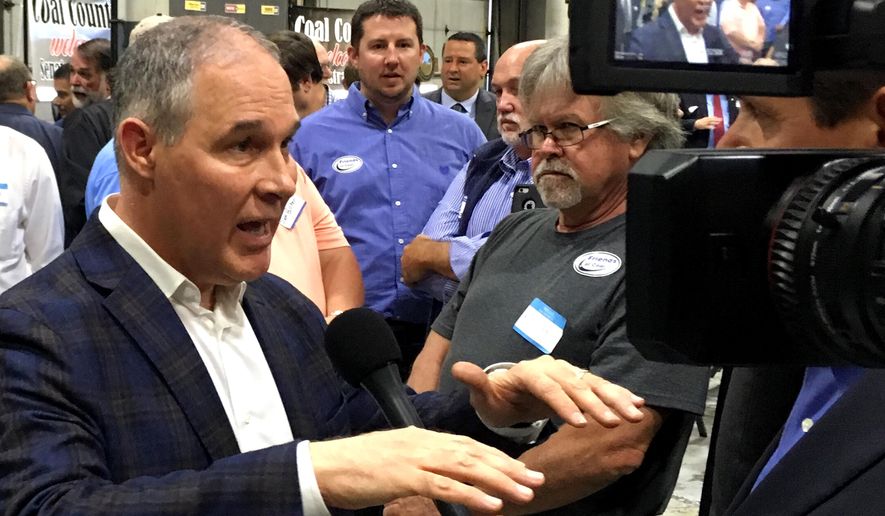Following through on one of President Trump’s campaign vows to coal country, the Environmental Protection Agency on Tuesday moved to formally kill the Clean Power Plan, beginning a lengthy process to dismantle the key Obama-era climate regulation.
The long-awaited announcement by EPA Administrator Scott Pruitt will kick-start repeal proceedings on the rule, which limits carbon emissions from power plants and was explicitly designed to reduce the amount of coal burned across the country. Mr. Pruitt’s central argument — that the plan is an abuse of federal power and has no basis in law — will be challenged in court, with environmental groups and Democrats quickly vowing to fight any move to repeal the CPP.
But the EPA chief says he’s on solid legal footing, and that repeal will save as much as $33 billion over the next 13 years.
“The Obama administration pushed the bounds of their authority so far with the CPP that the Supreme Court issued a historic stay of the rule, preventing its devastating effects to be imposed on the American people while the rule is being challenged in court,” Mr. Pruitt said in a statement. “We are committed to righting the wrongs of the Obama administration by cleaning the regulatory slate. Any replacement rule will be done carefully, properly, and with humility, by listening to all those affected by the rule.”
The CPP never actually went into effect as a result of the Supreme Court’s stay — a legal challenge brought by Mr. Pruitt while he was Oklahoma’s attorney general, along with a host of other litigants from states and the energy industry.
Still, the regulation succeeded in leading utilities to prematurely shut down coal-fired power facilities all over the country rather than tackle the monumental, expensive task of updating or retrofitting them to meet CPP standards.
Indeed, Republican lawmakers say that the proposal still had a massive impact even though it was never implemented.
“The rule has been especially devastating to coal country,” House Speaker Paul D. Ryan said in a statement. “Congress will continue to work with the Trump administration to promote an energy strategy that gets government out of the business of picking winners and losers and instead encourages all types of energy sources.”
In explaining the rationale behind repeal, the EPA said the CPP is inconsistent with the federal Clean Air Act. Mr. Pruitt argues that the proposal forced the federal government to go far beyond simply requiring emissions controls at individual sources of pollution — like power plants — and instead sought to transform the entire U.S. electricity generation system through regulation, a concept referred to as acting “outside the fence line” of the actual sources of pollution.
Furthermore, the EPA has radically altered the cost-benefit analysis previously done by the Obama administration. Mr. Obama’s EPA factored in supposed global climate benefits — such as money saved by a worldwide drop in average temperatures — as it calculated the costs of the proposal. That calculation allowed the Obama administration to claim that the global benefits of the CPP outweighed whatever costs would be suffered in the U.S.
“The previous administration compared U.S. costs to an estimate of supposed global benefits, and failed to follow well-established economic procedures in estimating those benefits,” the agency said Tuesday.
Specialists say the overhaul of cost-benefit calculations is especially noteworthy moving forward. The new formula allows the administration to consider the harm of climate change domestically but throws out supposed worldwide benefits of addressing pollution at home.
“The government’s new method of accounting for climate harm is very important because in several cases this year — cases concerning gas pipelines and coal mines — federal courts have asked the Trump administration to calculate the harms from climate change. The Clean Power Plan shows how the Trump administration may calculate these harms going forward,” said James Coleman, a law professor at Southern Methodist University.
As expected, the EPA’s decision sparked outrage from environmentalists, Democrats, energy efficiency groups and others who say the administration is committing the nation to a future of dirty fuel and dirty air.
“Today’s proposal to revoke the Clean Power Plan is inconsistent with EPA’s core mission of protecting public health and the environment … The health impacts of climate change demand immediate action,” reads a statement from the American Lung Association, American Academy of Pediatrics, and more than a dozen other health and medical groups. “Failing to address this public health crisis will have lasting consequences. The longer our nation’s leaders postpone action to clean up carbon pollution and other greenhouse gases, the more severe the health costs will be.”
• Ben Wolfgang can be reached at bwolfgang@washingtontimes.com.




Please read our comment policy before commenting.